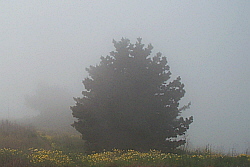| Danica's Science Project 2001 |
|||
Problem/Question What is fog and how does it form? Hypothesis Fog is small droplets of water that floats Overview The weather forecast always says low clouds and fog along the Pacific coast in California. Here is an actual Ventura forecast. VENTURA COUNTY COAST 330 AM PDT SAT MAY 5 2001 TODAY...SUNNY. HIGHS IN THE MID 60S TO LOWER 70S. TONIGHT...MOSTLY CLEAR EARLY...THEN AREAS OF LOW CLOUDS AND LOCALLY DENSE FOG DEVELOPING LATE. LOWS IN THE UPPER 40S TO MID 50S. SUNDAY...AREAS OF LOW CLOUDS AND LOCALLY DENSE FOG IN THE MORNING... OTHERWISE MOSTLY SUNNY. HIGHS IN THE MID 60S TO LOWER 70S. I want to be able to make fog and learn how it forms. I learned that there are two kinds of fog, advection and radiation. In California advection fog is mostly found at the coast. Advection fog occurs because warm, moist air is blown west towards the cold coastal waters, and will cool and fog will form. Fog plays an important part of the California climate. Like the California Redwood trees that benefit from fog when there is no rain. The fog deposits moisture on the pine needles. Water drips to the ground, which is sucked up by the shallow roots. Radiation fog occurs when a layer of hot, moist air lowers to the ground. Another layer of cool, dry air forms above it. The cold air cools the warm air. Then little droplets of water condense or float, which is radiation fog. This type of fog is mostly found in inland valleys. Fog is sometimes called the “marine layer” or “June gloom”. (click for larger view) |
|||
Next |
